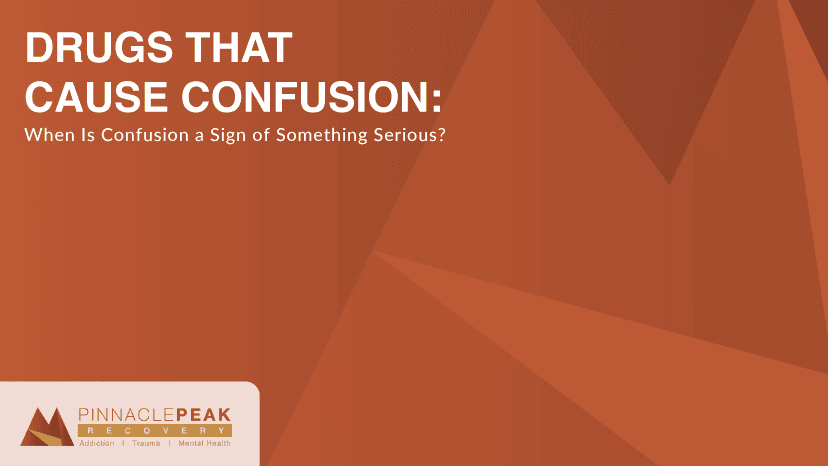Imagine going about your day, when you start to feel unbalanced. It feels like your brain has a fog in it. You find it hard to think, and you lose moments of time. When did you walk to the bathroom? Where was your phone? Why did you feel this way?
If you're one of the millions of people in Arizona who is currently managing a substance use disorder, confusion may be something you've experienced before.
Confusion is a scary symptom that can happen to many people, for a variety of reasons. One such thing that can cause confusion is substance use. As a facility dedicated to helping its community, our team of master’s level clinicians at Pinnacle Peak is happy to answer many of the questions we hear about the world of substance use. Today we’re going to talk about drugs that cause confusion and what you can do to address it.
What Is Confusion and Why Does it Happen?
There’s a difference between being confused about something and experiencing the side effect of confusion. When someone is experiencing confusion, they often feel disoriented. They might say that their thoughts feel slower than normal. Many people who are experiencing confusion have difficulties remembering things, paying attention, or making decisions.
This state of confusion rarely occurs for no reason. Beyond substance use, someone might also experience confusion because of illness, lack of sleep, low blood sugar, head injury, brain tumor, dementia, and more.
If you start to regularly experience confusion, it’s important to seek out a doctor to ensure something more serious isn’t occurring.
When Does Confusion Become a Sign of Substance Use?
If you or a loved one is experiencing confusion, how can you tell if it’s because of substance use?
The main way you can determine if it’s because of substance use is by looking out for other side effects. It’s not very common to only experience one side effect when substance use is involved.
There isn’t a singular substance that can lead to confusion, so keep an eye out for unusual or new behaviors in your loved one. This could include seclusion, staying out longer than normal, financial trouble, sudden changes in mood, increased depression, and more.
Beyond other side effects, you can also pay attention for drug paraphernalia around your home, or listen for the use of certain nicknames or “street names” for substance use in their conversations.

What Drugs Commonly Cause Confusion?
There are many different situations that can lead to confusion when substances are involved. From overdoses to withdrawal and long-term side effects, there are many different triggers for confusion. Even prescription medications can have confusion as a side effect. While this side effect isn’t common in every medication or drug, let’s take a look at some of the most common substances that can lead to confusion.
Prescription Medications That Cause Confusion
The most common medications that can cause confusion include antihistamines, antidepressants, and sedatives/pain relievers including opioid medications. It’s important to note that this isn’t serious in all cases.
Take sedatives and pain-relieving medications, as an example. The relaxed and drowsy state that can come with these medications can often lead to slowed thoughts or even delusions. This is often short-term and makes for light-hearted moments like those that are often shown in viral videos of people coming out of surgery.
In other instances, it’s important to note the context. How long have you been taking the medication? Did any of your medication routines change recently? Did you have other substances in your system, like alcohol, alongside your medication? Did you miss a dose of your medication?
Confusion can come from having a negative reaction to a medication, from experiencing withdrawal from a medication, or from polysubstance use when two or more substances in your body at the same time interact with each other.
Depressant Substances That Cause Confusion
There are two primary types of substances, depressants and stimulants. Of these two, the most common to lead to confusion are depressant-type medications.
Depressants slow down the body, from your reaction time to your cognitive ability and breathing. This can make confusion common during the consumption of these substances, as well as a potential side effect of long-term use due to how it impacts the brain over time.
Some of the most common depressant substances include alcohol, benzodiazepines, and opioids. If you notice them experiencing confusion alongside the slurring of words, blue tint to their skin, slowed breathing, or unconsciousness call for medical help as they’re likely experiencing an overdose.
When Does Confusion Become Concerning?
People who regularly deal with lack of sleep, low blood sugar, vitamin deficiencies, electrolyte imbalances, or are diagnosed with dementia might become accustomed to experiencing confusion. Whether you do or do not experience it regularly, at what point should you be concerned about confusion?
If someone has confusion come on suddenly, and/or they’re experiencing these other symptoms alongside it, you should contact 911.
Cold or clammy skin
Vertigo
Feeling faint
Sudden changes in breathing
Headaches
Fever
Shivering
Unconsciousness
Additionally, should confusion appear after a head injury or if the person is a danger to themself or others, don’t be afraid to reach out for medical help.
How to Help a Loved One Who’s Dealing with Confusion
If someone you love is acting disoriented, spacey, or is asking questions about where they are, here’s what you can do to help.
The first step to helping someone who is experiencing confusion is to ascertain if their behavior is from confusion, or something else. You can do this by asking them questions they should know the answer to such as their name, age, and what the date is. If they’re unsure or answer incorrectly, they’re likely confused.
When this happens, make sure you stick with your loved one. Having someone nearby can prevent them from injuring themselves or others, as well as keep them calm if needed. If they don’t recognize you, introduce yourself to them. Keep a calm tone and demeanor and talk with them about where they are and who they are. You can remind them of current events or plans they had for the day. Sometimes, having a calendar or clock nearby can be helpful for them to orient themselves.
If the person experiencing confusion has diabetes, make sure to help them correct their blood sugar levels. If their confusion lasts longer than 10 minutes, reach out for medical assistance.

Treatment Options for Confusion and Substance Use in Arizona
If you or a loved one are experiencing confusion, one of the most effective ways to address it is by stepping away from substance use. No matter your history with drugs, recovery is always an option.
Recovery can seem overwhelming, but it doesn’t have to be. There are many great options out there, and we’re here to help you find the right program that works for you. Whether you need to start with a drug detox program, or you need flexibility like what’s offered in our outpatient program, you can find the quality care you need.
Call To Talk To One Of Our Professionals Today!
If you want to start your journey toward recovery, our team at Pinnacle Peak is here for you. Our master’s level therapists are waiting to help, and our programs are designed with compassionate care in mind. There’s no wrong time to get started, so give us a call today at 866-377-4761 and we’ll help you out.
Clinical Excellence | Compassionate Care | Family Feel

